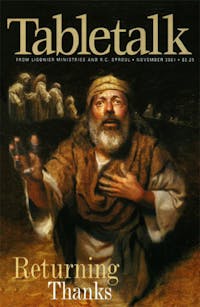
Request your free, three-month trial to Tabletalk magazine. You’ll receive the print issue monthly and gain immediate digital access to decades of archives. This trial is risk-free. No credit card required.
Try Tabletalk NowAlready receive Tabletalk magazine every month?
Verify your email address to gain unlimited access.
If upon hearing the word Mayflower you think of a moving and storage company rather than a ship, I suggest you read William Bradford’s Of Plymouth Plantation 1620–1647. If your understanding of Puritans is derived from The Scarlet Letter and The Crucible, then I again recommend Bradford’s sixteenth-century classic.
This book is a cross between a devotional journal and a historical account of the founding of a religious community in the New World. Every American Christian should take the time to read this book, because it so clearly shows the link between the English Reformation and the religious roots of what would become the United States.
Bradford’s book begins with a group of several hundred people who were not content with the Church of England. Their desire was to separate from, not reform, Anglicanism. Under persecution, they fled to Amsterdam, Netherlands, yet they still sought a place where they could build a community without the corruption of outside influences. This led one hundred and one Christian adventurers to board the Mayflower ship on July 1, 1620, and head to a world unknown.
In 1627, Bradford became the governor of the Plymouth colony, a role he was to fill until 1656.
In light of the Pilgrims’ God-centered ideals and desire to preserve holiness and purity, perhaps the most striking contrast of the book is Bradford’s honest portrayal of the sin at Plymouth. Drunkenness, robbery, and even bestiality were not foreign to this community of holy saints. But God continued to work through them and, to this day, we enjoy many blessings because of the seeds they planted more than 350 years ago.
Of Plymouth Plantation, published by McGraw-Hill, is a powerful reminder that we live outside the garden in a world filled with thorns and thistles. But Bradford’s account of the first Thanksgiving also challenges us to be thankful for God’s provisions for our needs.
